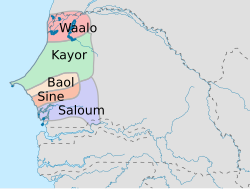Wolof Empire
| Jolof Empire | ||||||||||||||||||||
| Djolof | ||||||||||||||||||||
|
||||||||||||||||||||
|
Constituent States of the Jolof Empire
|
||||||||||||||||||||
| Capital | Linguère | |||||||||||||||||||
| Languages | Wolof, Serer | |||||||||||||||||||
| Religion | Traditional African religion, Islam (19th Century) | |||||||||||||||||||
| Government | Monarchy | |||||||||||||||||||
| Emperor (Buur-ba Jolof) | ||||||||||||||||||||
| • | 1350–1370 | Ndiadiane Ndiaye | ||||||||||||||||||
| • | 1543–1549 | Leele Fuli Fak | ||||||||||||||||||
| History | ||||||||||||||||||||
| • | Established | 1350 | ||||||||||||||||||
| • | Battle of Danki: empire reduced to a rump kingdom | 1549 | ||||||||||||||||||
| Area | ||||||||||||||||||||
| • | circa 1500 | 70,000 km² (27,027 sq mi) | ||||||||||||||||||
|
||||||||||||||||||||
| Warning: Value not specified for "" | ||||||||||||||||||||
The Jolof Empire (French: Djolof or Diolof), also known as the Wolof or Wollof Empire, was a West African state that ruled parts of Senegal from 1350 to 1549. Following the 1549 battle of Danki, its vassal states were fully or de facto independent; in this period, it is known as the Jolof Kingdom. This was largely conquered by the imamate of Futa Jallon in 1875 and its territories fully incorporated into French West Africa by 1890.
Traditional accounts among the Wolof agree that the founder of the state and later empire was the possibly mythical Ndiadiane Ndiaye (also spelled Njaajaan Njaay). Traditional stories of the ancestry of this leader vary. One suggests that he was "the first and only son of a noble and saintly Berber Almoravid father Abubakr Ibn Omar also called Abu Dardai and a Toucouleur princess who was the daughter of the Lam Toro, Fatimata Sall. This gives him an Almoravid lineage, ie a Berber and Islamic background, on his father's side, and a link on his mother's side to the Takrur aristocracy. James Searing adds that "In all versions of the myth, Njaajaan Njaay speaks his first words in Pulaar rather than Wolof, emphasizing once again his character as a stranger of noble origins."
It has been suggested that the foundations of the empire were set down by the voluntary association of several small states beginning with Waalo in the north and that just prior to the empire's formation, Waalo was divided into villages ruled by separate kings using the Serer title Lamane.
Ndiadiane was born Ahmad Abu Bakr also called Ahmadu Abubakar. The legend of Ndiadiane Ndiaye begins with a dispute over wood near a prominent lake. This almost led to bloodshed among the rulers but was stopped by the mysterious appearance of a stranger from the lake. The stranger divided the wood fairly and disappeared, leaving the people in awe. The people then feigned a second dispute and kidnapped the stranger when he returned. They offered him the kingship of their land and convinced him to do so and become mortal by offering him a beautiful woman to marry. When these events were reported to the ruler of the Sine, also a great magician, he is reported to have exclaimed "Ndiadiane Ndiaye" in his native Serer language in amazement. The ruler of the Kingdom of Sine (Maad a Sinig Maysa Wali) then suggested all rulers between the Senegal River and the Gambia River voluntarily submit to this man, which they did.
...
Wikipedia

